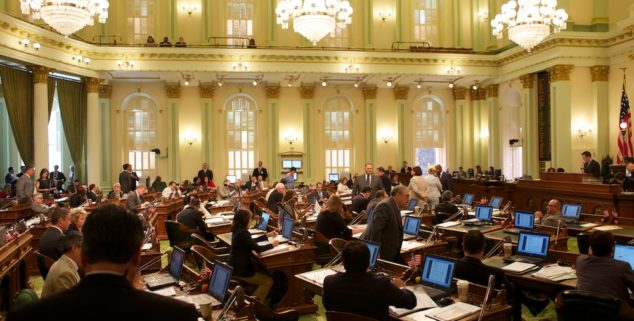Analysis
Reconsideration: A second bite at the apple
 The state Assembly in session. (Photo: Capitol Public Radio)
The state Assembly in session. (Photo: Capitol Public Radio)When a bill in the California Legislature fails passage either in committee or on the floor of the Assembly or Senate, it can be granted “reconsideration.”
That can mean a bill gets a new lease on life — or not.
After a committee has voted on a bill, reconsideration may be granted only one time.
According to the Legislature’s legal adviser, the Legislative Counsel, reconsideration means allowing another vote on a matter previously decided in a committee hearing or floor session.
This is an important rule because it provides a legislator with a “second bite at the apple,” giving a lawmaker another opportunity to build support among colleagues. Typically, it means that a lawmaker gets time to round up more votes in hopes of getting the bill passed.
After a committee has voted on a bill, reconsideration may be granted only one time.
The Legislature’s Joint Rule 62(a) declares that reconsideration may be granted within 15 legislative days or prior to the interim study joint recess, whichever occurs first.
But here’s where it starts getting a little tricky.
A vote on reconsideration may not be taken without the same notice required to set a bill for hearing — unless vote is taken at the same meeting at which the original vote to be reconsidered was taken and the author is present.
Once a reconsideration motion has lapsed, the question or measure returns to the same position it held prior to the motion being made.
An action taken by a committee may not be reconsidered except by a majority vote of the members of the committee. Reconsideration is usually granted by unanimous consent as a courtesy to a bill author.
Assembly
In the Assembly, a motion to reconsider must be made on the same day that the vote to be reconsidered was taken. On the Assembly floor, no motion to reconsider can be adopted unless it receives an affirmative recorded vote of 41 Assembly members.
Upon making a motion for reconsideration, the question or measure to be reconsidered is listed as unfinished business in the Assembly Daily File, and no further action can be taken prior to the next legislative day. When the motion to reconsider is not taken-up or continued on file, it lapses after a specified time.
Once a reconsideration motion has lapsed, the question or measure returns to the same position it held prior to the motion being made. When reconsideration is granted, the matter to be reconsidered resumes its exact position before the Assembly voted on the question. The author may take it up immediately after reconsideration is granted.
Reconsideration can serve as a valuable tool to legislators and interest groups in order to allow modifications to a measure to address why a measure initially failed passage.
Senate
In the Senate, the procedure differs slightly. A motion to reconsider any question may be made by any senator on the day on which the vote was taken. The motion may be considered on the day it is made, or on the succeeding legislative day, but it may not be further postponed without the agreement of 30 senators.
In the Senate, bills may be reconsidered by a majority vote (21), even though the bill required a two-thirds majority vote (27) for passage. Constitutional amendments that are adopted can be reconsidered by 14 votes, while constitutional amendments that have been defeated require a two-thirds vote (27) for reconsideration.
According to the Senate Rules, on the day on which a vote has been taken on any question, a motion to reconsider the vote may be made by any Senator. Reconsideration may be granted only once.
The motion may be considered on the day it was made or on the succeeding legislative day, but may not be further postponed without the concurrence of 30 Senators on the Senate floor.
Reconsideration can serve as a valuable tool to legislators and interest groups in order to allow modifications to a measure to address why a measure initially failed passage. For those opposed to the measure, however, it means remaining vigilant to ensure that the bill does not get revived in a manner that results in continued opposition.
—
Ed’s Note: This is the latest in a series of stories about procedures in the state Capitol. Chris Micheli is a registered lobbyist with the Sacramento governmental relations firm of Aprea & Micheli, Inc. He serves as an Adjunct Professor at McGeorge School of Law.
Want to see more stories like this? Sign up for The Roundup, the free daily newsletter about California politics from the editors of Capitol Weekly. Stay up to date on the news you need to know.
Sign up below, then look for a confirmation email in your inbox.

Leave a Reply